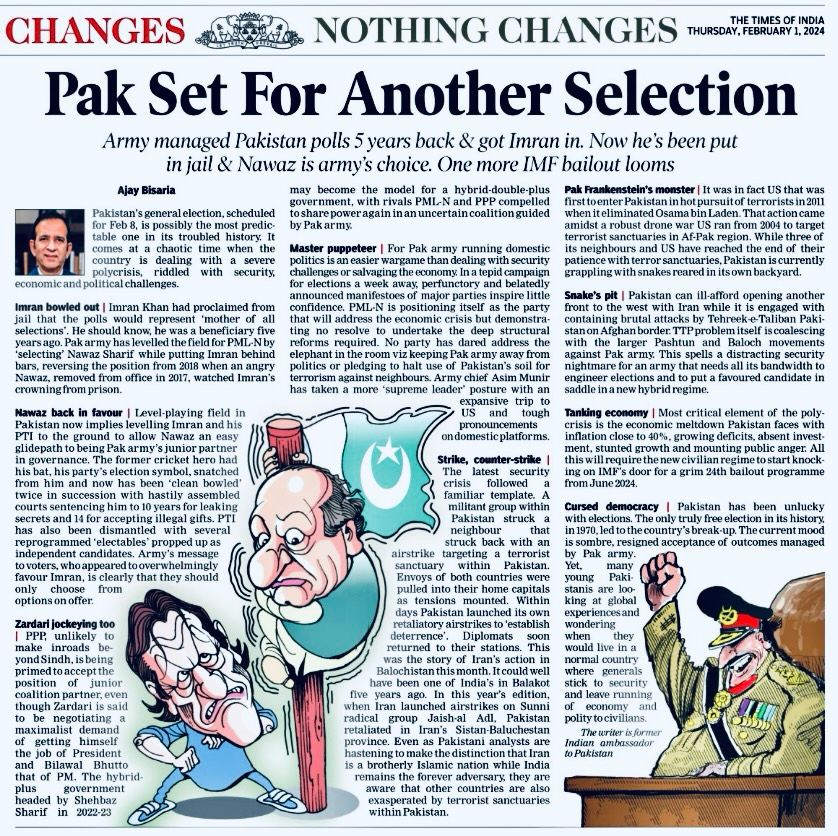Pak set for another selection
Army managed Pak polls 5 years back & got Imran in. Now he’s been put in jail & Nawaz is army’s choice. One more IMF bailout looms
Pakistan’s general elections, scheduled for 8 February, are possibly the most predictable in its history. They come at a difficult time when the country deals with a severe polycrisis riddled with security, economic and political challenges.
The latest security crisis followed a familiar template. A militant group within Pakistan struck a neighbour. The neighbour responded with an airstrike targeting a terrorist sanctuary within Pakistan. Envoys of both countries were pulled into their home capitals as tensions mounted. Within days, Pakistan launched its own retaliatory airstrikes to ‘establish deterrence.’ The diplomats soon returned to their stations. The crisis seemed to blow over, even if the bitterness remained abruptly.
This was the story of Iran’s action in Balochistan in January 2024. It could well have been one of India’s in Balakot five years ago. In this year’s edition, when Iran launched air strikes on a Sunni radical group, Jaish-al Adl, in Baluchistan, Pakistan retaliated in Iran’s Sistan province. Even as Pakistani analysts are hastening to make the distinction that Iran is a brotherly Islamic nation while India remains the forever adversary, they are aware that other countries are also exasperated by the terrorist sanctuaries within Pakistan. Some Afghans pointed out after the Iranian strikes that this was what the Afghans should have done twenty years ago, when the ISI deployed the Quetta Shura to mount attacks against the then Afghan regime and the American military presence. It was in fact the US, everyone’s neighbour, that was the first to enter Pakistan in hot pursuit of terrorists in 2011, when it eliminated Al Qaeda boss and 9/11 mastermind, Osama bin Laden. That action came amidst a robust ‘drone war’ that the US ran from 2004 to target terrorists in sanctuaries in the Af- Pak region. While three of its neighbours and the US have reached the end of their patience with terror sanctuaries, Pakistan is currently grappling with some snakes reared in its own backyard.
Pakistan can ill afford opening another front to the west with Iran, while it is engaged with containing brutal attacks by the militant Tehrik-e-Taliban Pakistan on the Afghan border. The TTP problem itself is coalescing with the larger Pashtun and Baloch movements against the army establishment. This spells a distracting security nightmare for an army that needs all its bandwidth to engineer elections and to put a favoured candidate on the saddle in a new hybrid regime.
The most critical element of the polycrisis is the economic meltdown that the country faces, with inflation close to 40 percent, growing deficits, absent investment, stunted growth and mounting public anger. All this will require the new civilian regime to start knocking on the doors of the IMF for a grim 24th bailout program from June 2024.
For Pakistan’s army, managing domestic politics is easier than dealing with the security challenge or salvaging the economy. In a tepid campaign for elections barely ten days away, the perfunctory and belatedly announced manifestoes of the major parties inspire little confidence and have a certain ‘cut and paste’ predictability. Nawaz Sharif’s PML-N is positioning itself as the party that will address the economic crisis, but demonstrating no resolve to undertake the deep structural reforms required to stabilise the economy. No party has dared address the elephant in the room viz keeping the army away from politics or pledging to stop using Pakistan’s soil for terrorism against neighbours. Army chief Asim Munir has taken a more ‘supreme leader’ posture, with an expansive trip to the US and tough pronouncements on domestic platforms.
Imran Khan has called it the ‘mother of all selections’. He should know, he was a beneficiary five years ago. The army has provided a ‘level playing field’ for the PML-N by ‘selecting’ Nawaz Sharif, while putting Imran Khan behind bars, reversing the position in the last engineered elections of 2018, when an angry Nawaz, removed from office in 2017, watched the crowning of Imran from prison. The level playing field in Pakistan often implies levelling the opposition to the ground, to allow the favoured candidate an easy glidepath to being the army’s junior partner in governance. This time around, Imran Khan’s PTI has been dismantled and splintered with several reprogrammed ‘electables’ propped up as independent candidates. The PPP, unlikely to make inroads beyond Sindh, is being primed to accept the position of the junior coalition partner, even though the wily Zardari is said to be negotiating a maximalist demand of getting himself the job of President and the young Bilawal Bhutto, that of PM. The hybrid plus government headed by Shahbaz Sharif in 2022-23 may become the model for a hybrid double plus government, with rival parties PML-N and PPP compelled to share power again in an uncertain coalition that would be guided by the all-powerful army.
Pakistan has been unlucky with elections. The only truly free election in its history, in 1970, led to the break-up of the country. The current mood is of a sombre, resigned acceptance of outcomes managed by the army rather than guided by public will. Yet, many young Pakistanis are looking across their borders at the global experience and wondering when they would live in a normal country where the army would stick to security and leave the running of the economy and polity to the civilians.
An edited version was first published in Times of India on February 1, 2024
